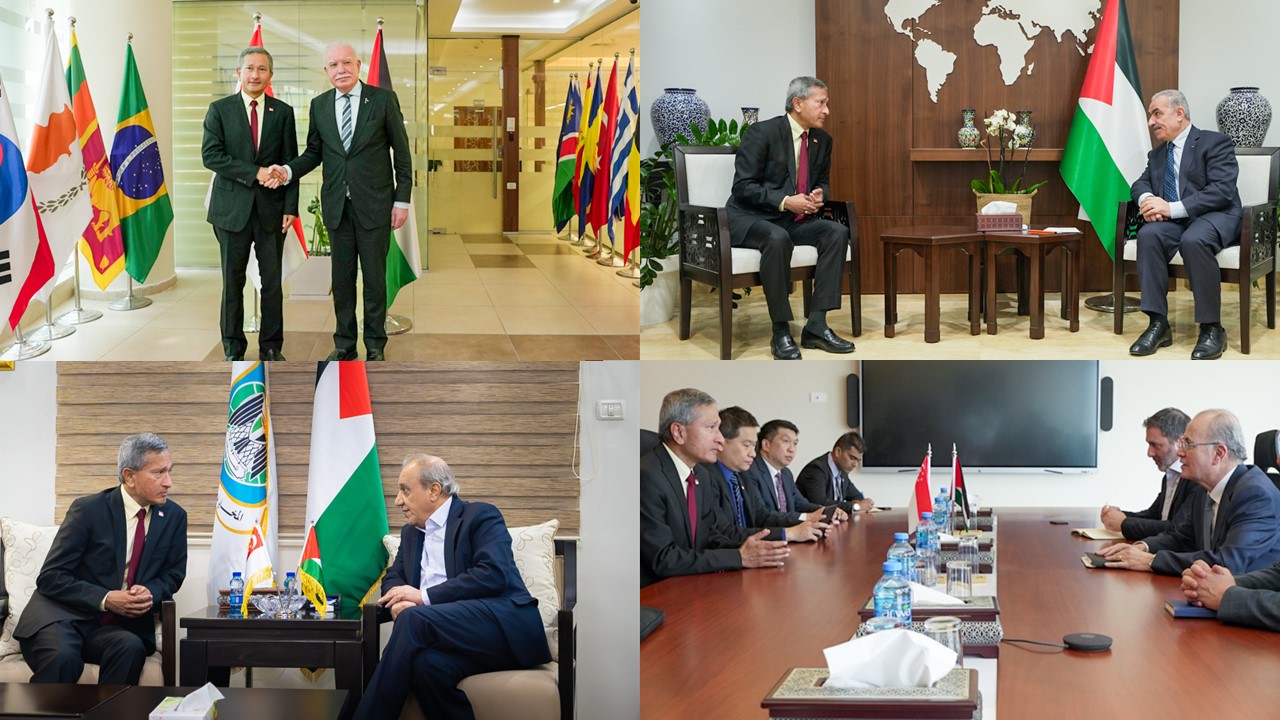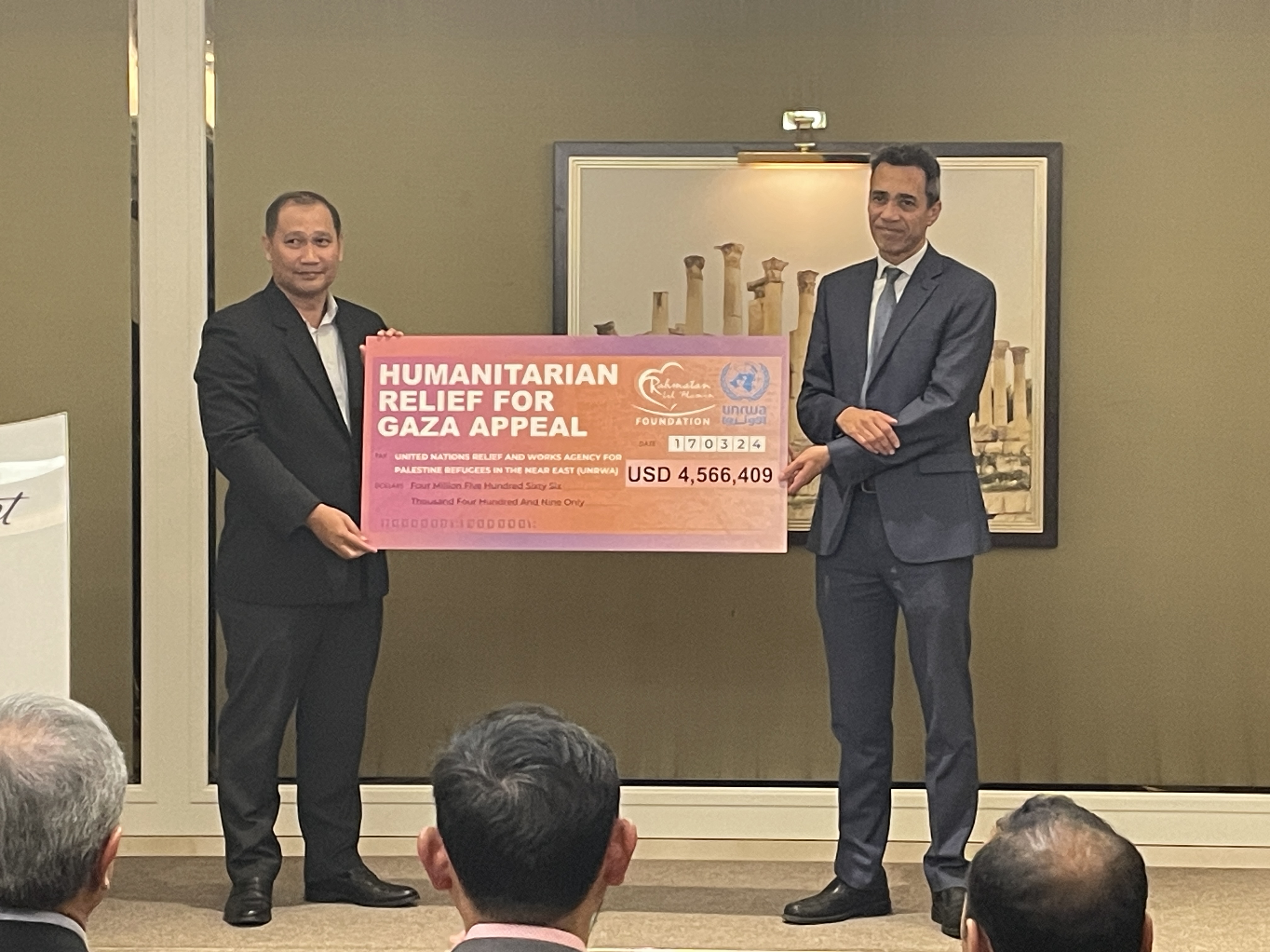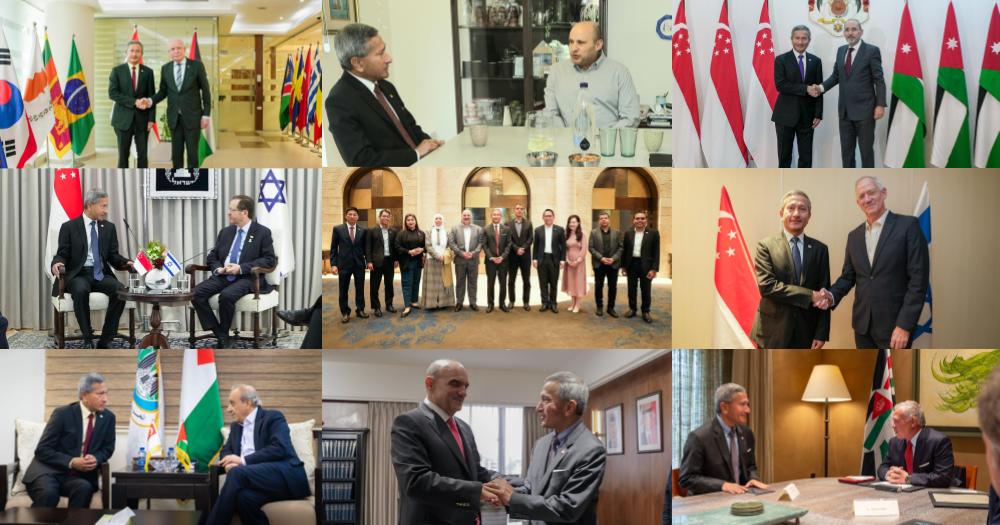On Feb. 29, during the Ministry of Foreign Affairs' Committee of Supply debate, foreign minister Vivian Balakrishnan made a point about Singapore's remarkable access in the Middle East.
Vivian said that Singapore had the "rare privilege" of having access to all the countries in the Middle East, even in a time of crisis.
But what does that actually mean? And what does that pragmatically look like?
Time Crisis
The Middle East is in the midst of its largest diplomatic and humanitarian crisis in perhaps the past decade, with the conflict in Gaza to worrying clashes in the Gulf of Aden, with international shipping being interdicted by Houthi terrorists.
It is a grim situation with a lot going on, and an argument could be made that most of leaders there would be pressed for time.
In the midst of this Vivian is blitzing his way through a who's who of diplomatic heavyweights in the region.
He's more than halfway through his trip now, and lets see who he's met and what he's done:
Qatar: PM count: 1, Head of State count: 0
The Doha section almost feels like a warm-up exercise, if it wasn't for the fact that Qatar is hosting the Israeli-Hamas negotiations for hostage release and ceasefire, perhaps the most crucial talks that will be held this year.
But Vivian's visit appears to be a fairly standard affair:
سررت بزيارتكم @VivianBala وزير الخارجية السنغافوري، حيث تباحثنا في سبل تعزيز وتطوير العلاقات الثنائية بين البلدين. ونتطلع للارتقاء بعلاقاتنا الثنائية بما يحقق أهدافنا ومصالحنا المشتركة. pic.twitter.com/x0Hcf5Rylt
— محمد بن عبدالرحمن (@MBA_AlThani_) March 15, 2024
Jordan: PM count 2: Head of State count: 1
Vivian then went to Amman, Jordan.
There he witnessed the airlift of Singapore's third tranche of humanitarian aid.
From there, the RSAF would airdrop the aid into Gaza.
While there, Vivian had an audience with Jordanian monarch King Abdullah II, as well as Prime Minister Bisher Al Khasawneh, and foreign minister Ayman Safadi.
Foreign Minister @VivianBala and SMS @zaqym had an audience with Jordan King Abdullah II Bin Al Hussein at the Royal Palace in Aqaba on 17 March.
They also called on Jordan PM and Minister of Defence His Excellency Bisher Al Khasawneh.
Read more: https://t.co/AcVUDj6vKa pic.twitter.com/mZHy8p9upm
— MFAsg (@MFAsg) March 18, 2024
Palestinian Authority: PM count 4, Head of State count: 1
The Palestinian Authority's (PA) leadership is undergoing a shakeup, with its current prime minister in the midst of handing over to a successor, so when Vivian visited on Mar. 18, he met not one, but two prime ministers.
He also met the PA's foreign minister Riad Malki, and the head of the PA's General Intelligence Service, Majed Faraj.
 Images via Ministry of Foreign Affairs, Singapore.
Images via Ministry of Foreign Affairs, Singapore.
This is not to mention his meetings with Palestinian Alumni of the Singapore Cooperation Programme, through which Singapore has helped train 700 PA officials over the past decade.
The Rahmatan Lil Alamin Foundation in Singapore handed over S$6.1 million in donations to the United Nations Relief and Works Agency for Palestine Refugees in the Near East (UNRWA).
 Image via Mothership.
Image via Mothership.
Israel: PM count: 5, Head of State count: 2
The Israel leg of the trip was particularly robust, with the Singapore delegation meeting with all levels of Israeli politics.
Not only did Vivian meet with Prime Minister Benjamin Netanyahu, but also foreign minister Israel Katz, and even President Isaac Herzog.
He also met with other parliamentarians and politicians, notably the United Arab List.
Also known as Ra'am, it represents Arab Israelis in parliament, and was a lynchpin party in the previous Israel government that was led by Naftali Bennett, who Vivian also met.
And these meetings probably were somewhat uncomfortable, with Vivian saying they could be "brutal" at times, due to Singapore's position that Israel's military actions had gone too far.
This was a reiteration of a position made during Vivian's parliamentary speech at the end of February 2024.
The working visit continued to the United Arab Emirates, and will take Vivian to Egypt and Saudi Arabia.
Access some areas
This was a fairly distinguished list of meetings for what was only the first six days of travel.
Vivian foreshadowed this in his reply to Leader of the Opposition Pritam Singh during the recent 2024 Budget debate, explaining that Singapore's long-term and principled approach to relations in the Middle East gave the country access:
"I think it has been a rare privilege that our diplomats and Ministers have access to all the countries in the Middle East, especially during this time of crisis.
We do not agree with everything that every counterpart in Israel and the Arab countries say, but they listen to us. They respect our positions. They work with us to deliver assistance. "
This was a unique level of access, not common to other countries from Southeast Asia:
"When I share notes with my counterparts in ASEAN and in other countries, very few people have access that we have had. "
Vivian was also unambiguous about why that access was given:
"I do not take that for granted. I think that we had that because we have conducted foreign policy in a principled, consistent, respectful, and constructive way for decades.
That gives us access. That gives us some relevance.
But never overestimate our weight."
Significant but don't overestimate what we can do
Political speech is often vulnerable to hyperbole, so it is notable when a situation is described exactly as it is.
The Middle East and its constituent countries were undergoing a moment of profound diplomatic and humanitarian crisis, in a situation where a foreign event was causing unprecedented levels of domestic unrest, not just in the Middle East, but across the world.
To put it bluntly, they're busy, and don't owe any obligation to meet with anyone if it is not beneficial. The widespread decision across the region to take the time to meet with Singapore's delegation is a prime example of the value that Singapore's diplomacy brings to both its partners and itself.
But to be consistent with Vivian's advice, it is probably best not to overestimate that value.
It's nice that they took the time to meet with the Singaporean delegation, to even share their perspectives, but Singapore's voice, while valued, remains small in that region.
Related stories
All images via Ministry of Foreign Affairs, Singapore

If you like what you read, follow us on Facebook, Instagram, Twitter and Telegram to get the latest updates.



